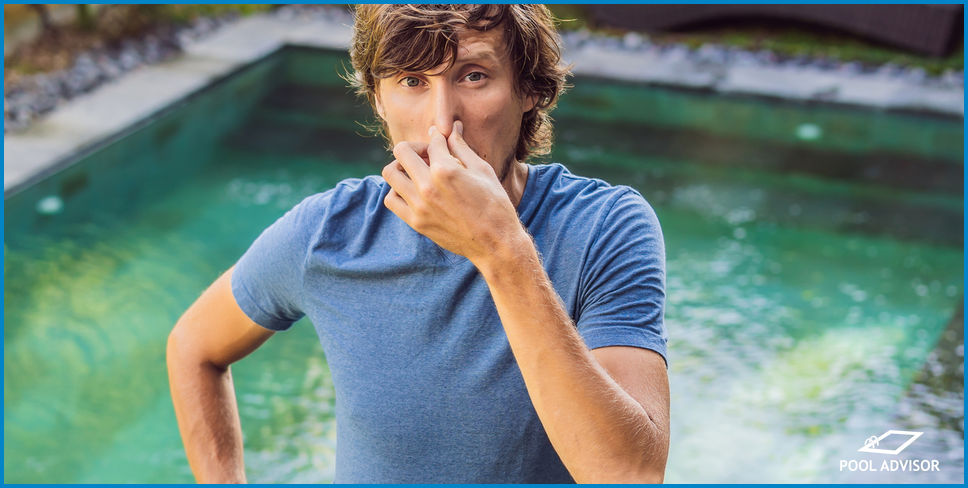
My Pool Has A Strong Chlorine Smell - How To Get Rid Of It?
Oftentimes chlorine pools develop a bad reputation based on the strong, chemical smell they can produce. In reality, this strong chlorine smell is not actually caused by the chlorine itself, but by another related compound in your pool’s water.
In this article we will discuss the real cause of your pool’s chlorine smell, other problems associated with the smell, as well as how to get rid of this chlorine smell.
Causes Of Strong Chlorine Smell
A strong chlorine odour that emanates from your pool indicates the presence of chloramines, which are a type of combined chlorine.
Chloramines in your pool form when free chlorine particles combine with organic material containing ammonia, producing the strong chlorine smell that you are noticing.
If you notice a chlorine smell coming from your pool, your water most likely has high amounts of ammonia containing substances that can create chloramines when they come in contact with chlorine.
These substances include urine, sweat, dead skin cells, hair or skin products, and other related contaminants.
Because these chloramines are very weak disinfectants and are normally themselves oxidised by free chlorine, the presence of this smell indicates that your free chlorine level is low (probably zero). A free and total chlorine test will confirm this.
Side-Effects Related To Pool Chlorine Smell
A strong chlorine smell should also be a warning sign for other problems caused by the chloramines.
For swimmers especially, these compounds tend to be extremely irritating to the eyes and skin, and can cause itchiness or even a mild rash to develop after coming in contact with the water.
Some swimmers and indoor pool staff have even been known to develop asthma after extended exposure to chloramines.
Chloramines also reduce the amount of free chlorine that is available in your pool. Free chlorine is normally available to attack microorganisms like bacteria and algae, but when it has formed a chloramine compound after being exposed to pollutants, this sanitising effect is diminished.
In fact, extra chlorine that is added to the pool will initially oxidise these chloramines, which means that they contribute to the chlorine demand in your pool (a phenomenon sometimes called chlorine lock).
As a result of this increased chlorine demand, you will have to add quite a bit of chlorine to your pool in order to maintain a sanitary environment.
How To Get Rid Of Chlorine Smell
To get rid of excess chloramines in your water, it is recommended that you shock your pool.
This may seem counterintuitive, especially if you are growing tired of that chlorine smell, but shock treatments are fast-oxidising and work to break down these smelly chloramines very quickly.
When choosing a shock treatment to reduce the amount of ammonia based pollutants and chloramines in your water, you may choose to use a chlorine based shock or a non-chlorine based shock treatment.
Although chlorine based shock treatments do work fine for this purpose, most pool owners prefer using non-chlorine based shock products in this situation because they are hesitant about adding more chlorine to their pool.
Our favourite shock treatment for this purpose is Shock N Swim, which uses a powerful, chlorine-free sanitising formula.
This product was specifically developed with the purpose of reducing chloramines in mind, so it is very effective at eliminating strong chlorine odours. It also contains small amounts of a clarifying agent for the added bonus of clearer water.
The best thing about this shock treatment is that it is super fast-acting, so it works quickly to reduce chloramines in your water and reduce the harsh chlorine smell you are experiencing.
With Shock N Swim, your pool can be used after you allow the product to circulate for a period of 15 minutes.
Preventing Strong Chlorine Smell
To prevent high levels of chloramines from developing in the future, make efforts to reduce the amount of ammonia containing pollutants that enter your water. Teach children the importance of not relieving themselves in the pool, and encourage swimmers to take a brief shower before entering the water.
While these small steps can help to reduce the amount of chlorine smell that your pool develops, certain amounts of chloramines will always develop through normal pool usage.
To prevent high numbers of them from accumulating, we recommend performing routine, weekly shock treatments using the product of your choice.
Use this pool shock calculator to work out the right dose for your pool.
Conclusion
Chloramines can be very off-putting due to their strong odour and can also contribute to skin and eye irritation. Because this strong chlorine smell is a sign of a type of pool pollution, products must be used to further sanitise your pool and eliminate the smell.
Do you have any questions about strong chlorine smells coming from your pool? Leave us a comment, we’d love to help!

Louis
A chemical engineer by trade, Louis is committed to debunking myths in the pool industry by explaining the underlying chemistry and making it accessible to all.
